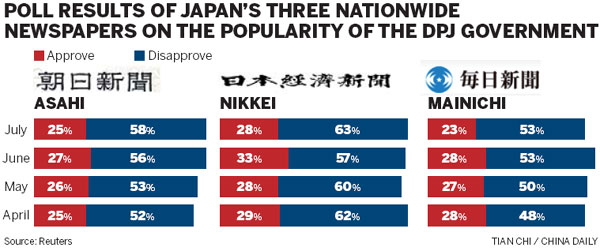Support for Japanese PM hits record low: Poll
Updated: 2012-08-07 08:26
By Wang Chenyan (China Daily)
|
|||||||||||
A new poll shows that Japanese voters' support for the government of Prime Minister Yoshihiko Noda has hit a record low, but experts agree that none of the major parties in Japan would be powerful enough to govern alone if a general election was called now.

.
Conducted by the nationwide Asahi newspaper, the poll showed a decline in popularity for the Democratic Party of Japan for the fifth consecutive month. The poll results, released on Monday, showed support dropping from 28 percent in April to 22 percent in August.
Voters in favor of opposition parties remained at 58 percent. Twenty-three percent chose the main opposition Liberal Democratic Party when asked which party they would vote for when electing members of the lower house of parliament. And 48 percent said they were undecided.
Zhou Yongsheng, an expert on Japanese studies at China Foreign Affairs University, said the poll indicates that the DPJ government is "shaky".
"The popularity of both parties is comparable now," Zhou said, recalling that in August 2009, the DPJ took office in a historic landslide.
As trouble piles up for the DPJ, the main opposition party is pressing for an early election.
Sadakazu Tanigaki, head of the LDP, told reporters in Hiroshima on Monday that "it is about time" that Noda's government decided to seek the public's judgment, urging the government to give assurances that it will call a general election ahead of the forthcoming parliamentary vote on a controversial tax increase bill.
And Tanigaki's party, so keen for an early poll, is threatening to submit a non-binding censure motion against Noda in the opposition-controlled upper chamber or present a motion of no confidence in the powerful lower house, if the current prime minister refuses to make such a promise.
But Noda, who was also in Hiroshima to attend a ceremony marking the 67th anniversary of the US atomic bombing of the city, brushed aside Tanigaki's request, saying that he will dissolve the lower house at an "appropriate time" at his own discretion, according to Kyodo News.
In the Asahi poll, voters were split over the timing of the election, with 41 percent seeking dissolution versus 45 percent against.
"It is hard to say which side would be more likely to win if Japan's lower house was dissolved as early as the opposition party has requested. Neither the ruling nor the opposition party will enjoy an overwhelming victory to form a cabinet alone," Zhou said, pointing out that a coalition government is highly possible.
Wang Ping, an expert on Japanese studies at the Chinese Academy of Social Sciences, agreed and said there are "two possible formulas" if a coalition government comes into being after the general election, to be held at the end of September.
"One is multiparty government, and the other is a coalition government of the DPJ and LDP," Wang said, adding that Noda is much more likely to fall from power "within weeks".
Zhou said the DPJ might win "by a slim majority" since it has more political stars than the LDP.
"However, since the DPJ is going to find it hard to maintain a majority in the lower house after the general election and since its policy is lacking coherence and consistency, it will only become more difficult for the party to carry out its administration, even if it keeps its ruling position," Zhou said.
Reuters contributed to this story.
wangchenyan@chinadaily.com.cn
Related Stories
Japan threatens military action over Diaoyu Islands 2012-07-28 12:59
Japanese PM's remarks 'irresponsible' 2012-07-27 20:18
Noda clutching at straws 2012-07-17 08:04
Japan ambassador returns to Beijing 2012-07-16 13:14
Noda sends a bad signal 2012-07-09 07:58
Japan PM congratulates Beijing-Tokyo Forum 2012-07-01 21:29
Today's Top News
President Xi confident in recovery from quake
H7N9 update: 104 cases, 21 deaths
Telecom workers restore links
Coal mine blast kills 18 in Jilin
Intl scholarship puts China on the map
More bird flu patients discharged
Gold loses sheen, but still a safe bet
US 'turns blind eye to human rights'
Hot Topics
Lunar probe , China growth forecasts, Emission rules get tougher, China seen through 'colored lens', International board,
Editor's Picks

|

|

|

|

|

|





